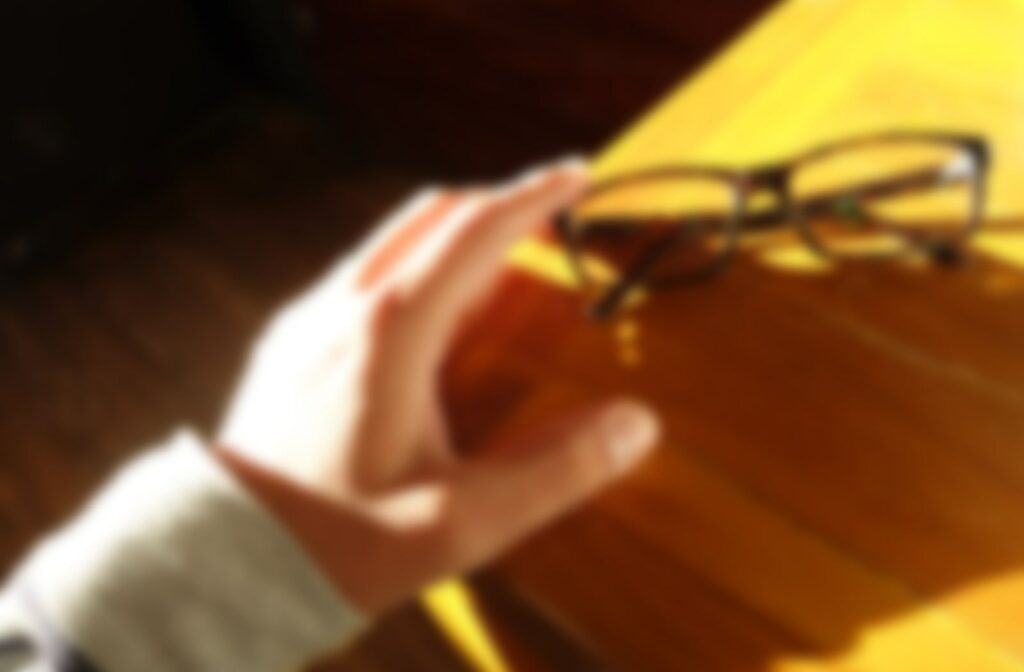Contacts are a popular alternative to glasses for those who have visual impairments. They can be convenient, easy to use, and some people prefer the look of going frameless. However, despite their benefits, contacts can sometimes cause issues like blurry vision.
You could have blurry vision from contact lenses due to a wrong prescription or fit, dry eyes, damaged contacts, or possibly an infection. This can be frustrating and even uncomfortable, and it’s important to speak with an eye doctor about it, as in the worst-case scenario, it could be a sign of a more severe eye condition or eye emergency.
Wrong Prescription or Fit
It’s important to get a dedicated eye exam and fitting for contact lenses, even if you already have glasses. Contact lenses have different prescription requirements, and wearing an incorrect lens prescription can mean the lenses won’t correct your vision adequately and could lead to issues like blurry vision.
During a contact lens exam and fitting, your optometrist takes a range of measurements and evaluations of your eye health to find your correct prescription. These measurements aren’t simply about finding your prescription, however. Contact lenses also need to fit your unique eye shape.
Your optometrist can use a keratometer or a corneal topographer to measure the curvature of your cornea, the clear dome at the front of the eye. This gives them a map of your eye’s surface that helps determine what type of contact lens should suit your eyes.
Ill-fitting contact lenses could do more than be uncomfortable and cause blurry vision. If worn for too long, they could even damage the eye.
Dry Eyes
Dry eyes can make wearing contact lenses painful and even cause blurry vision. This is because contacts need moisture on the eye to work and provide clear vision.
When your eyes are dry, your contact lenses can become dry, too. As that occurs, your contact lenses may no longer have a smooth surface to move with the natural movement of your eyes and may even stick to your corneas. Additionally, when your eyes are dry, your cornea’s shape can change, making your once perfectly fitted contacts struggle to help your eyes focus.
This effect can snowball as contact lenses further absorb the natural moisture from the eyes, leading to more dry eyes and more blurry vision.
Some signs you may have dry eyes include:
- Burning
- Redness
- A gritty feeling
- Watery eyes
- Stringy mucus
An optometrist can examine your tear health and offer dry eye treatments to help relieve your symptoms. In some cases, contacts explicitly designed for people with dry eyes can be an option, so you can still get the benefits of contacts without all the pain and frustration of dry eyes.
Contact Lens Damage
Damage to contact lenses can happen in several ways, including improper handling, accidental damage, and overwearing. When contact lenses are damaged, they can lose their shape and alignment, leading to optical defects that could affect your vision and eye health.
One of the ways damaged contact lenses can cause blurry vision is through scratches or tears on the lens surface. Scratches on the surface may be invisible to the naked eye, but they can scatter light before it reaches the retina, which may lead to blurry vision.
You could also damage your contacts by wearing them for too long. Overwearing can cause a buildup of proteins, lipids, dirt particles, and bacteria on the lens surface, making it hazy and clouded. These deposits could also limit the amount of oxygen reaching the eyes, causing a condition known as hypoxia, where the eye is deprived of oxygen.
You can avoid damaging your contacts by washing your hands before taking your contacts out or putting them back in and not sleeping in contacts. If your contacts are reusable, keep them disinfected by storing them in their case with the proper lens solution. Otherwise, dispose of your contacts according to their replacement schedule.
Eye Infections
Contact lenses are generally safe to wear and have a low chance of complications when used correctly. However, there is a risk of developing eye infections. One of the most common infections is called keratitis, an inflammation of the cornea that can cause it to swell.
When the cornea is swollen, it can change the shape of the eye. As a result, light could focus on the retina incorrectly, resulting in blurry vision, much like a refractive error.
Sometimes, bacteria and other harmful microorganisms can get trapped under a contact lens and cause eye irritation, inflammation, and, eventually, infection. One of the things you can do to help prevent eye infections is to follow proper hygiene and maintenance steps for your contacts.
Wash your hands thoroughly with soap and water before touching your contact lenses. You should also never share your lenses or lens case with anyone else. You should also avoid wearing contacts when swimming or showering, as doing so could introduce germs to your contacts.
It’s also important to remember to take out your contact lenses before you go to sleep. Sleeping with contact lenses can increase the risk of an infection by four times.
Finding the Source of Your Blurry Vision
Blurry vision can be caused by many factors, and contacts are just one of them. Instead of wondering, let a skilled optometrist uncover the cause with a comprehensive eye exam.
Precision Eye Care’s expert team can examine your eyes for abnormalities. If your contact lenses are the reason behind your blurriness, we can help you find lenses that fit your eyes and lifestyle more suitably and provide guidance on how to take care of them.
Enjoy the benefits of contacts without suffering from blurry vision. Book a contact lens fitting today.





